- Home
- Fredric Brown
Night of the Jabberwock Page 14
Night of the Jabberwock Read online
Page 14
He got a flashlight out of his glove compartment and came back. He bent down with it and took a close look at those streaks.
I stepped closer to look, too. Hank stepped back, as though he was suddenly afraid to have me behind him and peering over his shoulder.
So I didn’t have to look. I knew what those streaks were, or what Hank thought they were.
He said, “Seriously, Doc, where’s the key?”
“I’m serious,” I told him. “I gave it to Rance Kates. I didn’t know what key it was then. I’m pretty sure I do now.
I thought I knew what was in that luggage compartment now, too.
He looked at me uncertainly and then walked part way across the street, angling so he could watch me. He cupped his hands around his lips and called out. “Rance! Hey, Rance!” And then looked quickly back to see that I was neither sneaking up on him nor trying to get into the car to drive away.
Nothing happened and he did it again.
A window opened and Kates was silhouetted against the light back of it. He called back, “What the hell, Hank, if you want me come up here. Don’t wake up the whole God damn town.”
Hank looked back over his shoulder at me again. Then he called, “Did Doc give you a key?”
“Yes. Why? What kind of a yarn is he feeding you?”
“Bring down the key, Rance. Quick.”
He looked back over his shoulder again, started toward me, and then hesitated. He compromised by staying where he was, but watching me.
The window slammed down.
I walked back around the car and I almost decided to light a match and look at those stains myself. And then I decided, what the hell.
Hank came a few steps closer. He said, “Where you going, Doc?”
I was at the kerb by then, I said, “Nowhere”, and sat down.
To wait.
CHAPTER TWELVE
Then fill up the glasses as quick as you can,
And sprinkle the table with buttons and bran:
Put cats in the coffee, and mice in the tea—
And welcome Queen Alice with thirty-times-three!
THE courthouse door opened and closed. Kates crossed the street. He looked at me and asked Hank, “What’s wrong?”
“Don’t know, Rance. Looks like blood has dripped from the luggage compartment of Doc’s car. It’s locked. He says he gave you the key. I didn’t want to—uh—leave him to come up and get it. So I yelled for you.”
Kates nodded. His face was toward me and Hank Ganzer couldn’t see it. I could. It looked happy, very happy.
His hand went inside his coat and came out with a pistol. He asked, “Did you frisk him, Hank?”
“No.”
“Go ahead.”
Hank came around Kates and came up to me from the side. I stood up and held out my hands to make it easy for him. The bottle of whisky was in one of them. He found nothing more deadly than that.
“Clean,” Hank said.
Kates didn’t put his pistol away. He reached into a pocket with his free hand and took out the key I’d given him. He tossed it to Hank. “Open the compartment,” he said.
The key fitted. The handle turned. Hank lifted the door.
I heard the sudden intake of his breath and I turned and looked. Two bodies; I could see that much. I couldn’t tell who they were from where I stood. Hank leaned farther in, using his flashlight.
He said, “Miles Harrison, Rance. And Ralph Bonney. Both dead.”
“How’d he kill ’em?”
“Hit over the head with something. Hard. Must’ve been several blows apiece. There’s lots of blood.”
“Weapon there?”
“What looks like it. There’s a revolver—an old one—with blood on the butt. Nickel-plated Iver-Johnson, rusty where the plating’s off. Thirty-eight, I think.”
“The money there? The pay roll?”
“There’s what looks like a brief case under Miles.” Hank turned around. His face was as pale as the starlight. “Do I got to—uh—move him, Rance?”
Kates thought a minute. “Maybe we better not. Maybe we better take a photo first. Listen, Hank, you go upstairs and get that camera and flash-gun. And while you’re there, phone Dr. Heil to get here right away. Uh—you’re sure they’re both dead?”
“Christ yes, Rance. Their heads are beaten in. Shall I call Dorberg, too?” Dorberg is the local mortician who gets whatever business the sheriffs office can throw his way; he’s Kates’ brother-in-law, which may have a bearing on the fact.
Kates said, “Sure, tell him to bring the wagon. But tell him no hurry; we want the coroner to have a look before we move ’em. And we want the pix even before that.”
Hank started for the courthouse door and then turned again. “Uh—Rance, how about calling Miles’ wife and Bonney’s factory?”
I sat down on the kerb again. I wanted a drink more badly than before, and the bottle was in my hand. But it didn’t seem right, just at that moment, to take one. Miles’ wife, I thought, and Bonney’s factory. What a hell of a difference that was. But Bonney had been divorced that very day; he had no children, no relatives at all—at least in Carmel City—that I knew of. But then I didn’t have either. If I was murdered, who’d be notified? The Carmel City Clarion, and maybe Carl Trenholm, if whoever did the notifying knew that Trenholm was my closest friend. Yes, maybe on the whole it was better that I’d never married. I thought of Bonney’s divorce and the facts behind it that Carl—through Smiley—had told me. And I thought of how Miles Harrison’s wife would be feeling tonight as soon as she got the news. But that was different; I didn’t know whether it was good or bad that nobody would feel that way about me if I died suddenly.
Just the same I felt lonely as hell. Well, they’d arrest me now and that would mean I could call Carl as my attorney. I was going to be in a hell of a spot, but Carl would believe me—and believe that I was sane—if anybody would.
Kates had been thinking. He said, “Not yet—either of them, Hank. Milly especially; she might rush down here and get here before we got the bodies to Dorberg’s. And we might as well be able to tell the factory whether the pay roll’s there when we phone them. Maybe Stoeger hid it somewhere else and we won’t get it back tonight.”
Hank said, “That’s right, about Milly. We wouldn’t want her to see Miles—that way. Okay, so I’ll call Heil and Dorberg and then come back with the camera.”
“Quit talking. Get going.”
Hank went on into the courthouse.
It wasn’t any use, but I had to say it. I said. “Listen, Kates, I didn’t do that. I didn’t kill them.”
Kates said, “You son of a bitch. Miles was a good guy.”
“He was. I didn’t kill him.” I thought, I wish Miles had let me buy him that drink early in the evening. I wish I’d known; I’d have insisted and talked him into it. But that was silly, of course; you can’t know things in advance. If you could, you could stop them happening. Except of course in the Looking-Glass country where people sometimes lived backwards, where the White Queen had screamed first and then later had stuck the needle into her finger. But even then—except, of course, that the Alice books were merely delightful nonsense—why hadn’t she simply not picked up the needle she knew she was going to stick herself with?
Delightful nonsense, that is, until tonight. Tonight somebody was making gibbering horror out of Lewis Carroll’s most amusing episodes. “Drink Me”—and die suddenly and horribly. That key—it had been supposed to open a fifteen-inch-high door into a beautiful garden. What it had opened the door to—well, I didn’t care to look.
I sighed and thought, what the hell, it’s over with now. I’m going to be arrested and Kates thinks I killed Miles and Bonney, but I can’t blame him for thinking it. I’ve got to wait till Carl can get me out of this.
Kates said, “Stand up, Stoeger.”
I didn’t. Why should I? I’d just thought, why would Miles or Ralph mind if I took a drink out of this bottle in my hand? I
started to unscrew the top.
“Stand up, Stoeger. Or I’ll shoot you right there.”
He meant it. I stood up. His face, as he stood then, was in the shadow, but I remembered that look of malevolence he’d given me in his office, the look that said, “I’d like to kill you.”
He was going to shoot me. Here and now.
It was safe as houses for him to do so. He could claim—if I turned and ran and he shot me in the back—that he’d shot because I was trying to escape. And if from the front that I—a homicidal maniac who had already killed Miles and Bonney—was coming toward him to attack him.
That was why he’d sent Hank away and given him two phone calls to make so he wouldn’t be back for minutes.
I said, “Kates, you’re not serious. You wouldn’t shoot a man down in cold blood.”
“A man who’d killed a deputy of mine, yes. If I don’t, Stoeger, you might beat the rap. You might get certified as a looney and get away with it. I’ll make sure.” That wasn’t all of it, of course, but it gave him an excuse to help his own conscience. I’d killed a deputy of his, he’d thought. But he’d hated me enough to want to kill me even before he’d thought that. Hatred and sadism—given a perfect excuse.
What could I do? Yell? It wouldn’t help. Probably nobody awake—it was well after three o’clock by now—would hear me in time to see what happened. Hank would be phoning in the back office; he wouldn’t get to the window in time.
And Kates would claim that I yelled as I jumped him; yelling would just trigger the gun.
He stepped closer; if he shot me in the front there’d have to be powder marks to show that he’d shot while I was coming at him. The gun muzzle centred on my chest, barely a foot away. I could live seconds longer if I turned and ran; he’d probably wait until I was a dozen steps away in that case.
His face was still in the shadow, but I could see that he was grinning. I couldn’t see his eyes or most of the rest of his face, just the grin. A disembodied grin, like that of the Cheshire cat in Alice. But unlike the Cheshire cat, he wasn’t going to fade away.
I was. Unless something unexpected happened. Like maybe a witness coming along, over there on the opposite sidewalk. He wouldn’t shoot me in cold blood before a witness. Carl Trenholm, Al Grainger, anybody.
I looked over Kates’ shoulder and called out, “Hi, Al!”
Kates turned. He had to; he couldn’t take a chance on the possibility that there was really someone coming.
He turned his head just for a quick glance, to be sure.
I swung the whisky bottle. Maybe I should say my hand swung it; I hadn’t even remembered that I still held it. It hit Kates alongside the head and like as not the brim of his hat saved his life. I think I swung hard enough to have killed him if he’d been bare headed.
Kates and the revolver he’d been holding hit the street, separately. The whisky bottle slid out of my hand and hit the paving; it broke. The paving must have been harder than Kates’ head—or maybe it would have broken on Kates’ head if it hadn’t been for the brim of his hat.
I didn’t even stop to find out if he was dead. I ran like hell.
Afoot, of course. The ignition key of my car was still in my pocket, but driving off with two corpses was just about the last thing in the world I wanted to do.
I ran a block and winded myself before I realized I hadn’t the faintest idea where I was going. I slowed down and got off Oak Street. I cut back into the first alley. I fell over a garbage can and then sat down on it to get my wind back and to think out what I was going to do. But I had to move on because a dog started barking.
I found myself behind the courthouse.
I wanted, of course, to know who had killed Ralph Bonney and Miles Harrison and put their bodies in my car, but there was something that seemed of even more immediate interest; I wanted to know if I’d killed Rance Kates or seriously injured him. If I had, I was in a hell of a jam because—in addition to everything else against me—it would be my word against his that I’d done it in self-defence, to save my own life. My word against his, that is, if he were only injured. My word against nothing at all if I’d killed him.
And my word wouldn’t mean a damn thing to anybody until and unless I could account for two corpses in my car.
The first window I tried was unlocked. I guess they’re careless about locking windows of the courthouse because, for one reason, there’s nothing kept there that any ordinary burglar would want to steal, and for another reason because the sheriff’s office is in the building, and somebody’s on duty there all night long.
I slid the window up very slowly and it didn’t make much noise, not enough, anyway, to have been heard in the sheriffs office, which is on the second floor and near the front. I put it down again, just as quietly, so it wouldn’t be an open give-away if the search for me went through the alley.
I groped in the dark till I found a chair and sat down to collect what wits I had left and figure what to do next. I was fairly safe for the moment. The room I’d entered was one of the small anterooms off the court-room; nobody would look for me here, as long as I kept quiet.
They’d found the sheriff all right, or the sheriff had come around and found himself. There were footsteps on the front stairs, footsteps of more than one person. But back here I was too far away to hear what was being said, if any talking was going on.
But that could wait for a minute or two.
I wished to hell that I had a drink; I’d never wanted one worse in my life. I cussed myself for having dropped and broken that bottle—and after it had saved my life, at that. If I hadn’t happened to have it in my hand, I’d have been dead.
I don’t know how long I sat there, but it probably wasn’t over a few minutes because I was still breathing a little hard when I decided I’d better move. If I’d had a bottle to keep me company, I’d have gladly sat there the rest of the night, I think.
But I had to find out what happened to Kates. If I’d killed him—or if he’d been taken to the hospital and was out of the picture—then I’d better give myself up and get it over with. If he was all right, and was still running things, that wouldn’t be a very smart thing to do. If he’d wanted to kill me before I’d knocked him out with that bottle, he’d want to do it so badly now that he would do it, maybe without even bothering to find an excuse, right in front of Hank or any of the other deputies who were undoubtedly being woken up to join the manhunt, in front of the coroner or anybody else who happened to be around.
I bent down and took my shoes off before I got up. I put one in each of the side pockets of my coat and then tiptoed out through the court-room to the back stairs. I’d been in the building so many thousand times that I knew the layout almost as well as that of my own home or the Clarion office, and I didn’t run into anything or fall over anything.
I guided myself up the dark back staircase with a hand on the banister and avoiding the middle of the steps, where they’d be most likely to creak.
Luckily there is an el in the upstairs hallway that runs from the front stairs to the back ones so there wasn’t any danger of my being seen, when I’d reached the top of the stairs, by anyone entering or leaving the sheriffs office. And I had dim light now, from the light in the front hallway near the sheriff’s office door.
I tiptoed along almost to the turn of the hall and then tried the door of the county surveyor’s office, which is next to the sheriff’s office and with only an ordinary door with a ground glass pane between them. The door was unlocked.
I got it open very quietly. It slipped out of my hand when I started to close it from the inside and almost slammed, but I caught it in time and eased it shut. I would have liked to lock it, but I didn’t know whether the lock would click or not, so I didn’t take a chance on that.
I had plenty of light, comparatively, in the surveyor’s office; the ground glass pane of the door to the sheriff’s office was a bright yellow rectangle through which came enough light to let me see the office fu
rniture clearly. I avoided it carefully and tiptoed my way toward that yellow rectangle.
I could hear voices now and as I neared the door I could hear them even better, but I couldn’t quite make out whose they were or what they were saying until I put my ear against the glass. I could hear perfectly well, then.
Hank Ganzer was saying, “It still throws me, Rance. A gentle little old guy like Doc. Two murders and——”
“Gentle, hell!” It was Kates’ voice. “Maybe when he was sane he was, but he’s crazier than a bedbug now. Ow! Go easy with that tape, will you?”
Dr. Heil’s voice was soft, harder to understand. He seemed to be urging that Kates should let himself be taken to the hospital to be sure there wasn’t any concussion.
“The hell with that,” Kates said. “Not till we get Stoeger before he kills anybody else. Like he killed Miles and Bonney and damn near killed me. Hank, what’s about the bodies?”
“I made a quick preliminary examination.” Heil’s voice was clearer now. “Cause of death is pretty obviously repeated blows on their heads with what seems to have been that rusty pistol on your desk. And with the stains on the pistol butt, I don’t think there’s any reason to doubt it.”
“They still out front?”
Hank said, “No, they’re at Dorberg’s—or on their way there. He and one of his boys came around with his meat wagon.”
“Doc.” It was Kates’ voice and it made me jump a little until I realized that he was talking to Dr. Heil and not to me. “You about through? With that God damn bandage, I mean. I got to get going on this. Hank, how many of the boys did you get on the phone? How many are coming down?”
“Three, Rance. I got Watkins, Ehlers and Bill Dean. They’re all on their way down. Be here in a few minutes. That’ll make five of us.”
“Guess that fixes up things as well as I can here, Rance,” Dr. Heil’s voice said. “I still suggest you go around to the hospital for an X-ray and a check-up as soon as you can.”
“Sure, Doc. Soon as I catch Stoeger. And he can’t get out of town with the state police watching the roads for us, even if he steals a car. You go on around to Dorberg’s and take care of things there, huh?”

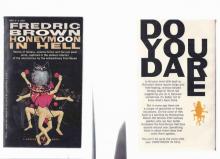 Hall of Mirrors
Hall of Mirrors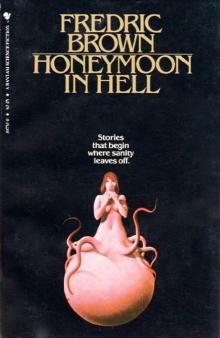 Honeymoon in Hell
Honeymoon in Hell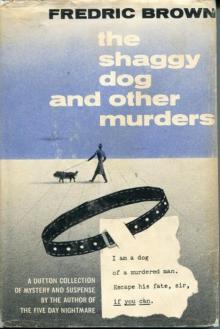 The Shaggy Dog and Other Murders
The Shaggy Dog and Other Murders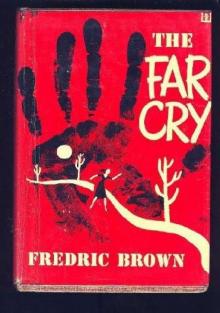 The Far Cry
The Far Cry Arena
Arena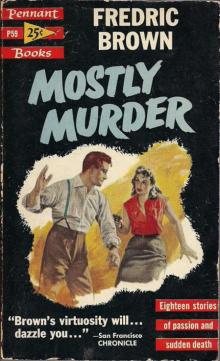 Mostly Murder
Mostly Murder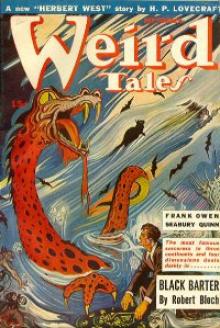 The Geezenstacks
The Geezenstacks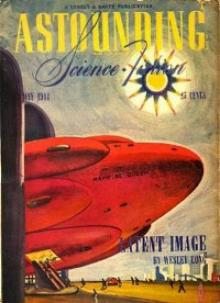 The Yehudi Principle
The Yehudi Principle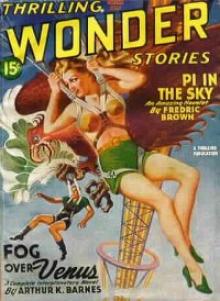 Pi in the Sky
Pi in the Sky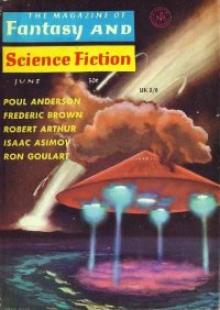 Eine Kleine Nachtmusik
Eine Kleine Nachtmusik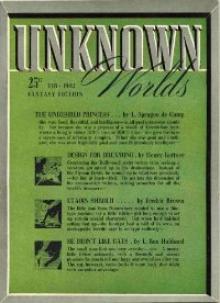 Etaoin Shrdlu
Etaoin Shrdlu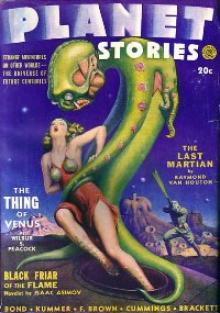 The Star Mouse
The Star Mouse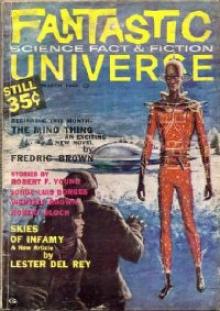 The Mind Thing
The Mind Thing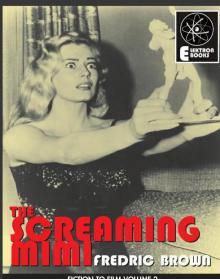 The Screaming Mimi
The Screaming Mimi The Fabulous Clipjoint
The Fabulous Clipjoint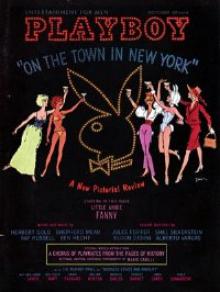 Puppet Show
Puppet Show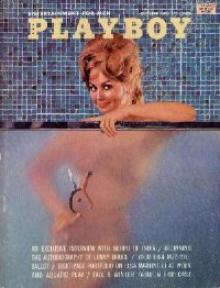 It Didn't Happen
It Didn't Happen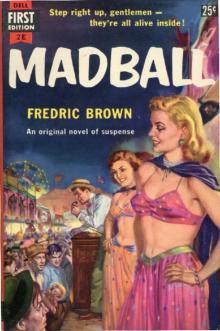 Madball
Madball Happy Ending
Happy Ending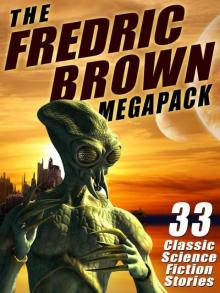 The Fredric Brown Megapack: 33 Classic Science Fiction Stories
The Fredric Brown Megapack: 33 Classic Science Fiction Stories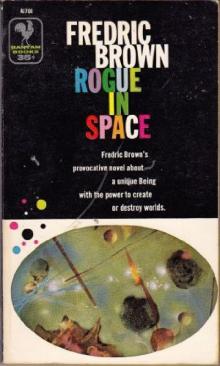 Rogue in Space
Rogue in Space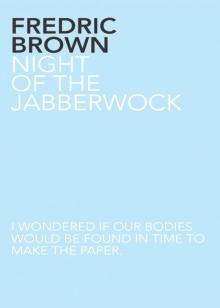 Night of the Jabberwock
Night of the Jabberwock The Dead Ringer
The Dead Ringer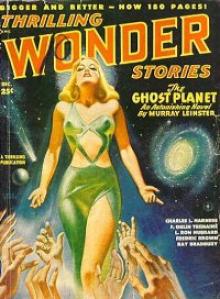 Knock
Knock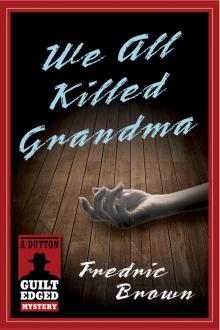 We All Killed Grandma
We All Killed Grandma Space On My Hands
Space On My Hands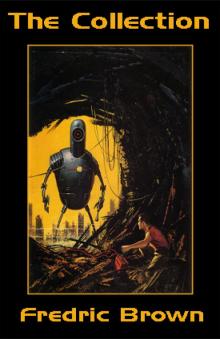 The Collection
The Collection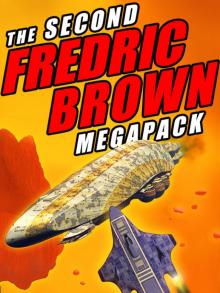 The Second Fredric Brown Megapack: 27 Classic Science Fiction Stories
The Second Fredric Brown Megapack: 27 Classic Science Fiction Stories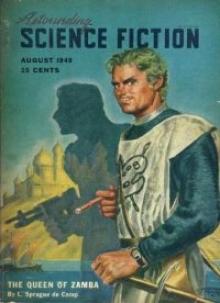 Letter to a Phoenix
Letter to a Phoenix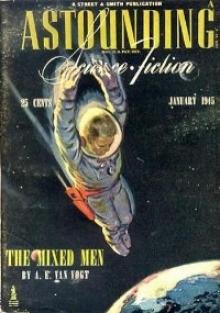 The Waveries
The Waveries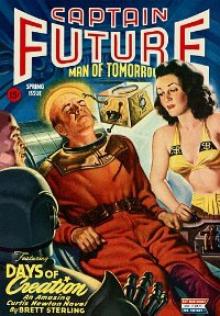 Nothing Sirius
Nothing Sirius The Deep End
The Deep End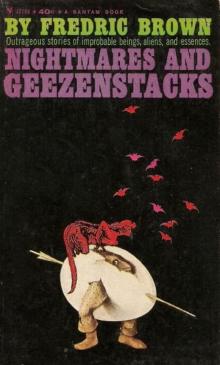 Nightmares & Geezenstacks
Nightmares & Geezenstacks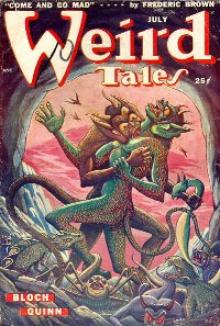 Come and Go Mad
Come and Go Mad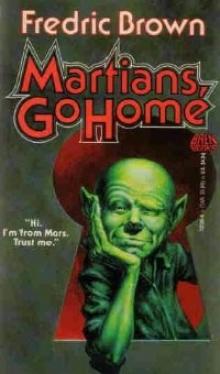 Martians, Go Home
Martians, Go Home